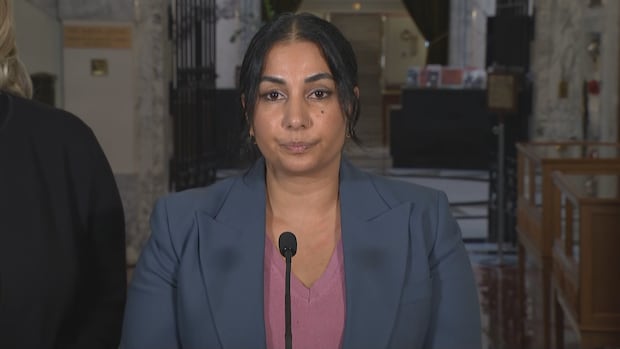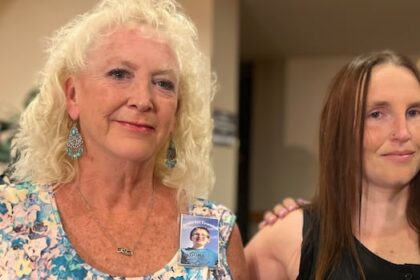British ColumbiaBritish Columbia’s attorney general celebrated new federal bail reform legislation that aims to make sentences tougher and bail more difficult for repeat, violent offenders. Critics say bail reform raises Charter concernsEmily Fagan · CBC News · Posted: Oct 23, 2025 8:23 PM EDT | Last Updated: 2 hours agoListen to this articleEstimated 4 minutesBritish Columbia Attorney General Niki Sharma said new bail legislation introduced by the federal government reflects B.C.’s leadership in keeping repeat and violent offenders off the streets, (Emily Fagan/CBC News)British Columbia’s attorney general celebrated proposed federal bail reform legislation that aims to make sentences tougher and bail stricter and more difficult to obtain for repeat, violent offenders. Niki Sharma said Thursday that some of the more than 80 changes to the federal Criminal Code outlined in the bill reflect specific reforms the province had requested to improve public safety.“Many provisions in that bill came straight from our work to make sure that the streets are safer,” Sharma said.“I’m glad that [federal Justice] Minister [Sean] Fraser listened to what B.C. was asking for.”The bill reflects changes that politicians, police chiefs, and victims’ rights advocates have said are critical to improve public safety — but has also sparked concern among legal experts. Critics say the proposed changes may infringe on an individual’s Charter rights to be presumed innocent – and without additional resources they could place added strain on B.C.’s justice system at a time when staffing shortages are taking a toll.“The amendments in this bill, especially with respect to bail, are regressive and, to our knowledge, not supported by empirical data,” said Veronica Martisius, litigation staff counsel for the B.C. Civil Liberties Association.“We hope the leaders in B.C. will remember that upholding the rights and freedoms protected by Charter is paramount.”Reverse onuses intended to make bail more difficult to obtainThe changes include the creation of new so-called “reverse onuses,” which means detention is the default option and it’s up to a bail seeker to demonstrate why they should not remain behind bars while they await trial. These new reverse onuses, if passed by Parliament, will apply to people charged with violent or organized crime-related car theft, break and entering, trafficking in persons or human smuggling, assault, sexual assault that involves choking, strangulation or suffocation and extortion involving violence. It would also direct the courts and the police on which factors to consider before releasing someone on bail, including whether it is against the public interest or needed to protect victims and witnesses, and whether the alleged crime involved random or unprovoked violence.Some of these reforms were requested earlier this year by the family of Bailey McCourt, a Kelowna, B.C., woman who was allegedly murdered by her ex-husband just hours after he was released on bail for assault.However, defence lawyer Rajinder Sahota described reverse onuses as a “draconian step” that lack empirical evidence. “There are approximately 200,000 to 250,000 criminal cases in Canada in any given year, and only half of those result in a finding of guilt,” Sahota said. “So what we’re talking about is detaining tens of thousands of innocent people each year in imprisonment when they are not guilty.”Minister of Justice and Attorney General of Canada Sean Fraser announced the Liberal government’s new bail reform legislation on Thursday. (The Canadian Press)These changes, Sahota says, will disproportionately impact Indigenous and other marginalized people in Canada who are overrepresented in the justice system.Sharma said the issue of the presumption of innocence, and the potential impact on marginalized people, should be addressed but is separate from bail reform.“To me, that’s a very important concern, and it’s not about the changes today, it’s about the bias in the system,” she said.“In my view, it’s bigger and we need to have a criminal justice system that puts the right people behind bars and not the wrong people.”More funding needed for effective change: Crown counsel associationB.C. Crown Counsel Association president Adam Dalrymple said he expects the proposed changes will spark an influx of people being held in custody prior to their bail hearings, requiring more resources to house and process them through the justice system.“It will require more resources on the front lines, and the question is, who is going to pay for that?” he said, adding that provinces are responsible for the administration of justice. When asked, Sharma did not indicate that new funding would accompany these changes.Dalrymple said the proposed changes aren’t what’s needed most to address public safety concerns.“If you properly fund your criminal justice system and your prosecution service and the social services that are available to individuals who may be committing lower level offences while they’re on bail, you may be able to have the impact you seek to have without changing the law,” he said.ABOUT THE AUTHOREmily Fagan is a journalist based in Victoria, B.C. She was previously a staff reporter for the Toronto Star. Her work has also appeared in publications including the Globe and Mail, Vice, and the Washington Post. You can send her tips at emily.fagan@cbc.ca.With files by Meera Bains and John Paul Tasker
B.C. attorney general calls Ottawa’s proposed bail regime changes a public safety victory











